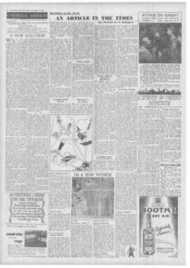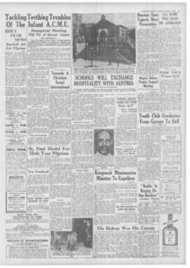Page 2, 4th November 1949
Page 2

Report an error
Noticed an error on this page?If you've noticed an error in this article please click here to report it.
Tags
Share
Related articles
Problem Of Evolution The Catholic Attitude?
Evolution A Non-catholic View
Evolution A Final Letter
•
Darwin’s Legacy
PROBLEM OF EVOLUTION
The Catholic Attitude
Sue-In reply to Mr. Lavoipierre's letter in THE CATHOLIC HERALD of October 21, my attack on the School Broadcasts on evolution was neither thoughtless nor ill-defined. Having studied the evidence for evolution at Cambridge and the evidence against it at a later date, I feel as well equipped to give an opinion as your correspondent. However, Professor Wood Jones has given his opinion on that " great observer and scientist" Charles Darwin in the British Medical Journal (October 2, 1948), thus: " Darwin had no first-hand knowledge whatever of the anatomy of monkeys, apes or men-he was unacquainted with or ignored much readily accessible current literature on the subject, and such information as he possessed at second-hand consisted largely of ill-assorted and ill-assimilated odds and ends. . . . Any comparative anatomist who open mind can only dismiss the reads the Descent of Man with an whole thesis as one lacking any factual basis in primate anatomy.'
Mr. Lavoipierre quotes an eloquent Jesuit, Fr. Michel Riquet. who repeats, parrot-like, the recapitulation theory. He states that the human embryo passes through worm, fish and ape-like stages during its development. This idea has long since been rejected by almost all modern biologists. Even Dr. Swinton, of the Natural History Museum. an evolutionist, admitted in a lecture given in 1947 that in his opinion " the recapitulation theory is just not true." Professor Waldo Shumway, of the University of Illinois, states that " there is never a time in the development of a mammal when it could be mistaken for a fish," and Sir Arthur Keith says, " the human embryo at no stage is anthropoid in appearance."
Mr. Lavoipierre asks where I have ever heard of a true scientist stating a hypothesis as a fact. Although I could quote such scientists, my cornplaint was against the B.B.C. whom I quoted as saying dogmatically that fish acquired legs and amphibians evolved into reptiles. Your correspondent then attributes to me the dogmatic statement that " it is an impossibility for a reptile to evolve into a bird or mammal." But he correctly quotes me in the previous paragraph as saying that this was " physically impossible," meaning a natural evolution in gradual stages. In the debate just published under the title Is Evolution a Myth? Douglas Dewar asked Professor Haldane how various typically reptilian features such as the lower jaw and ear bones could gradually change into the typically mammalian features. Professor Haldane had to admit that some of these changes must have been effected in a single generation. This is tantamount to a miracle which is a divine but not a physical possibility. Your correspondent agrees that " never have scientists postulated that mammals have evolved from reptiles as we know them." Can, then, the hypothetical creatures from which they might have evolved truly be called reptiles?
With regard to the other transformations which are supposed to have taken place The Difficulties of the Evolution Theory, by D. Dewar, will show how impossible they are. Dr. Austin H. Clark, of the U.S. National Museum, Washington, has said. " there is not the slightest evidence that an of the major groups (of animals) arose from any other." Professor R. Goldschmidt, of the University of California, goes even further and says, " Nowhere have the limits of the species been transgressed, and these limits are separated from the limits of the next good species les the unbridged gap, which also includes sterility."
Mr. Lavoipierre quotes Guyenot as a leading exponent of the theory of evolution. Ciuyenot contributed to the volume of the Encyclopaedie Francaise (1938) on Living Organism, but the editor, Professor P. Lemoine, a geologist, after reading the articles which he expected would establish evolution, wrote. " It follows from this exposition that the theory of evolution is impossible. Fundamentally, in spite of appearances. nobody believes in it any longer. . . . Es tendon is a kind of dogma which the priests no longer believe, but which they maintain for their people:* I agree with your correspondent that " the problem of evolution has not really been adequately presented to the English scientific public." As Professor Vialleton once said, " The text books have put into the foreground only that which is favourable to it, passing by in silence all that is not so, or which is contrary to it." The result is that I am obliged to quote mainly from American and other non-British sources.
With regard to the bearing of evolution on religion Woolsey Teller, of the American Association for the Advancement of Atheism, has published a pamphlet called Evolution Implies Atheism. It is self-evident that an atheist must adopt evolution as the only alternative to special creation. The intimate connection betwen Darwin's Origin of Species and his religious doubts has been clearly shown by Dr. R. E. D. Clark in Darwin: Before and After. published last year.
But the theory is also in contradiction to the Bible, which states that God created man in His own image. and Our Lord confirms the Genesis account in Matthew lg. 4. Furthermore. the genealogy in Luke 3, which goes back generation by generation to Adam, then states that Adam was the son of God, not the son of an ape-man.
But should it still be claimed that these broadcasts have no bearing on the problem of man's soul or the teaching of religion, then let it be noted that the Minister of Education in New Zealand said that " a perusal of the suspended broadcasts shows that a contrary idea is thoroughly interwoven in them," and gave this as his main reason for banning them. He declared further that " the moral and aesthetic influence, the disrespect for parenthood, the quite unnecessary impression of degradation or disgust in relation to human origins, the teaching of slang, would all incur censure."
No, Sir, my attack on these broadcasts was well founded both on scientific, aesthetic and religious grounds. W. E. FILMER.
23, Dingwall Road. Croy don, Surrey. Sim-Your heading, "The Catholic Attitude," emphasises the real point; and surely the C.A. can only be the desire for truth-especially in what touches the honour and glory of God.
People who write (or broadcast) for children have a grave responsibility. since children can't judge (or study) for themselves. The same applies, up to a point, as regards writing on science, philosophy, and theology for the average reader. We are not giving him a fair deal if we quote authorities already superseded in the swift advance of modern science; and we seriously mislead him if we generalise mistakenly and leave him to make an obvious (but false) inference.
It is necessary to illustrate these remarks. I hate scoring off people. But I still more hate seeing my fellow Catholics misled. When Monsieur Lavoipierre says "Evolution has not really been adequately presented to the English scientific public," he is making a generalisation which implies that the rest of the world's scientific education has been more evolutionary-minded than ours. Never mind the truth or non-truth of this: the point is that he does not say which parts of the world specially boosted evolution, or what " ideals" they founded on it. The U.S.A. founded a very materialistic and Godless public morality on it, which has hurt us a lot. The German mite tarists and their philosophers of the last century built their " might is right " philosophy on it: Treitschke wrote: If the strong get the better of the weak it is an inexorable law of life." His disciple Bernhardi added, " Wherever we look in nature we find that war is a fundamental law of development. Thfs great verity has been convincingly demonstrated in modern times by Charles Darwin." ". .. War gives a biologically just decision." Hitler said the same things. But nowhere in the world has evolution been taken so desperately seriously. and taught so fully, as in Russia, starting from Marx's statement: " Darwin's book is very important and serves me as a basis in natural science for the struggle in history." The immense importance of the evolutionary theory in Soviet education can be verified by anybody who buys the Penguin book called A Scientist in Russia, by Eric Ashby (1947). The number of hours allotted and the insistent words to teachers, will surprise the reader.
Until well on into the present century, evolution meant Darwinism; there was no other evolutionary teaching. But the logical French did not bite. They refused Darwin their academic honours; and only later admitted him on the strength of that part of his writings that was not on evolution. No one is safe in generalising on the question of evolution in British and world education who has not read the recent books on this; nor in quoting anatomists who wrote before Professor Wood Jones's recent debunking of the supposed ape-anatomy of man; nor in quoting anything but the very, very latest physics. Since this letter is on principles, I have not .space to give particulars of the latest books and papers: if desired, I will do so later. L'Abbe Brent'. etc., etc., etc., and the preacher in Notre Dame. are very " Vieux jeu " (if saying it in French makes it more intelligible).
Probably the vast majority of English-speaking Christians, both lay and clerical, take evolution for granted; and this chiefly because the school and university text books do. (Mr. Filmer, by the way, is not a Catholic, but just a man who wanted Catholic support in protecting the children against a Godless form of teaching.) So the two worried correspondents are barking up the wrong tree.
VERA BARCLAY.
Sne-I have been on holiday and am a week late in replying to Miss Vera Barclay. Catholic thought is not opposed to certain kinds of evolutiotiary theory, which date back for instance to the time of St. Augustine. Darwin tacked on to this a special theory " natural selection " and the objection to it is that it is so vast a matter that no precise. scientific proof can be advanced in its support. That is its weakness and that is why I described it still as " pure assumption." But I cannot assent to Miss Barclay's thesis that philosophy deals only with matters of speculation. Here, I think. she is on dangerous ground, for philosophy appeals to facts and the datum of experience on which it is primarily based is provided by an instrument --the evidence of the senses-earlier than scientific observation, infinitely more certain than the inductions of the sciences and placed by nature at the disposal of every man. It consists of truths so simple that they are universally and absolutely valid. so immediate and evident that their certainty exceeds that of the best established scientific conclusions. (Maritain: Introduction to Philosophy, p. 120).
C G. MORTIMER. 2 White Buildings.
Lee-on-Solent.
[Unfortunately, a controversy on Evolution itself is impossible within the limits of our space. It ■vould he wrong for people to be put into a false conscience through being persuaded that the theory of Evolution (apart from the question of the creation of the soul) is incompatible
with Catholic faith. But this. Of course, has no relevance to the scientific merits of argaments for and against Evolution. This particular controversy started in connection with the B.B.C. Schools Lectures, and it would he more useful if morally doubtful excerpts from those lectures, if any, were discussed. --Editor. C.H.1
blog comments powered by Disqus









